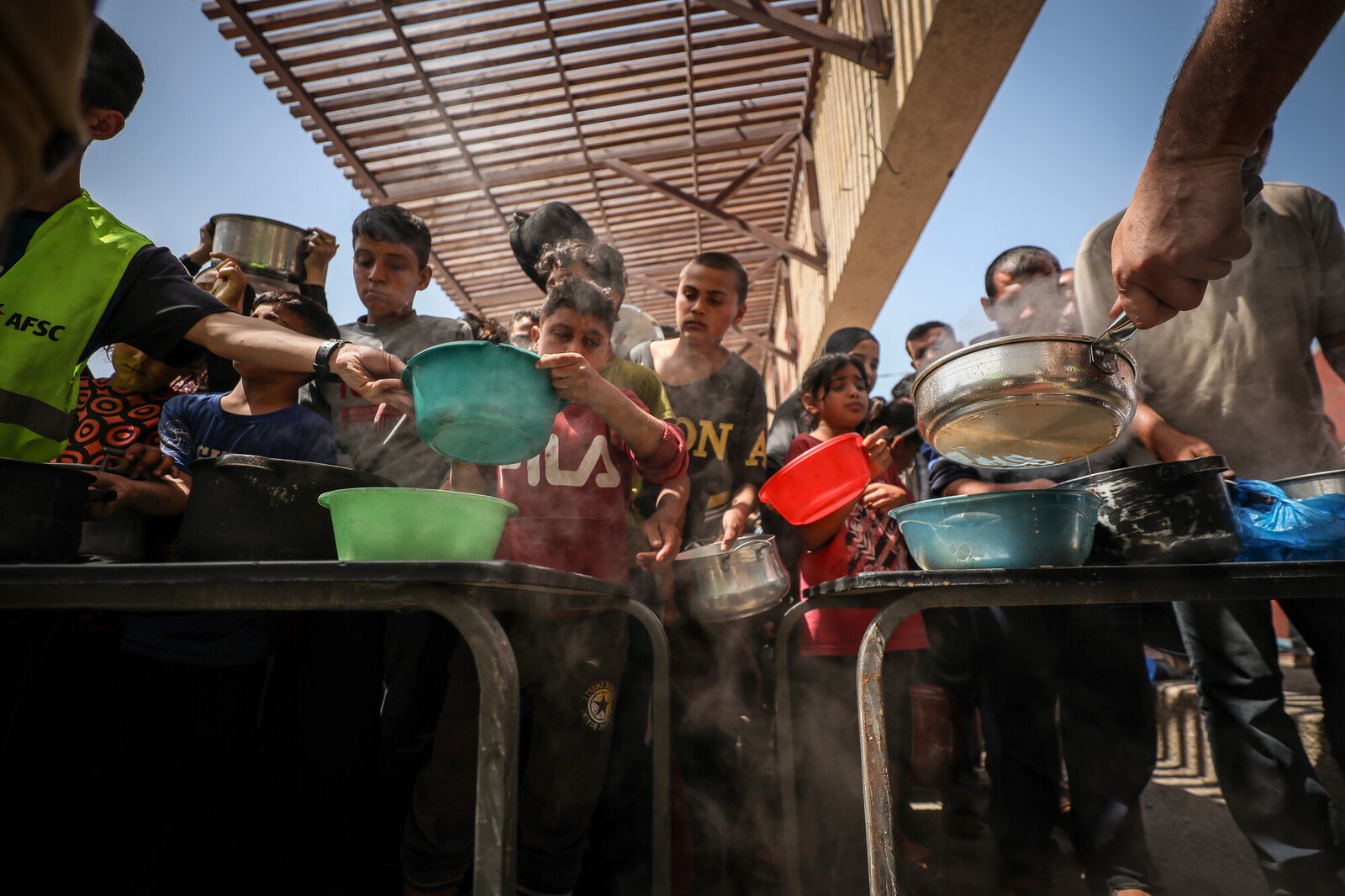
Children receive food from a meal distribution site supported by AFSC in May 2025. Amjad Al Fayomi
Our bodies are approaching what’s known as stage five of starvation—catastrophic hunger. There is no coming back from this point.
In my last article, I wrote: “Our bodies can no longer hold us.” Today, I say: Our bodies have officially collapsed.
Everywhere I look, there’s a body giving out. A woman falls to her knees in the street. A child can no longer walk. A man sways, barely able to stand. The images aren’t isolated. They are daily. They are everywhere. They are us.
But starvation doesn’t happen overnight. It has taken almost two years for our bodies to reach this level of collapse. I haven’t lost 15 kilograms (33 pounds) in one week; it has been a long, slow deterioration. Our bodies didn’t fall apart in a day. This famine is not sudden. It is not a new emergency. It is a deliberate, man-made policy of slow death.
Gaza is enduring one of the worst humanitarian catastrophes in modern history. It is not a drought. It is not a natural disaster. It is a siege.
Most hospitals are either non-functional or partially destroyed. Fuel and medical supply shortages have paralyzed critical services, including dialysis, surgeries, and emergency rooms. Sewage systems have collapsed, and with them, our hope for health. Water is contaminated. Waste piles in the streets. Diseases like respiratory infections and diarrhea are spreading rapidly and killing silently.
Our immune systems are collapsing, just like everything else in Gaza. When I get sick now, it takes weeks to recover, if I recover at all. My body no longer has the strength to fight. In a recent post by Palestinian journalist Anas al Sharif, he reported that “I noticed that the wounded arriving from Israeli airstrikes were bleeding less, despite the severity of their injuries. When I asked a doctor, he explained that extreme hunger reduces blood platelets and body fluids, weakening circulation and limiting bleeding, but it also makes the body more prone to rapid collapse and sudden death within minutes.”
There’s nothing left in us. Not even to bleed.
I used to say, “It’s never too late to act.” But now, it is. For many, it already was. The Integrated Food Security Phase Classification (IPC) projects that from April to September 2025, 244,000 people in Gaza, about 12% of the population, will face catastrophic hunger (IPC Phase 5). That means death by starvation is no longer a risk. It is a reality.
Three months ago, I wrote that I was surviving on one meal a day. Now, even that one meal is no longer guaranteed. From the heart of Gaza—from the very core of starvation—I am telling you, the world that weaponizes aid, politicizes food, and watches our children get shot for holding a bag of flour—Since when has weaponizing food become the norm? When did a bag of flour become a death sentence?
Israel has blocked all humanitarian aid from entering Gaza since March. The Israeli-controlled and U.S.-backed Gaza Humanitarian Foundation (GHF) aid system was established in late May. It claimed it was a humanitarian operation but was staffed by military and security contractors while experienced humanitarian organizations were denied access. Since then, over 1,000 Palestinians have been killed by Israeli forces while trying to access food and aid, according to the United Nations. That includes people shot near GHF distribution points, U.N. convoys, and humanitarian relief trucks.
The Government Media Office in Gaza warns: a mass killing of over 100,000 children is imminent if baby formula and food are not allowed in immediately. As of today, 127 people have died from hunger and malnutrition, including 85 children. On July 20 alone, health authorities announced 19 starvation deaths in a single day.
This is not just starvation, it’s a systemic, weaponized collapse. And while we are being pushed to the edge of death, even aid has become a battlefield.
Last week, AFSC joined over 100 NGOs in a joint letter warning of catastrophic starvation in Gaza. We’ve issued every report. We’ve raised every alarm. The question is: Will the world finally listen?
Our efforts must lead to action, to pressure, to a global refusal to accept this genocide as normal.
Because every minute lost means another body breaks. We need you to: Demand an immediate end to the genocide, call for full humanitarian access and the lifting of the siege, pressure your representatives and government to stop funding and enabling these war crimes, and share this. Make it impossible for your leaders to ignore.
Do not let silence be your answer to our starvation. We are running out of time and out of lives.